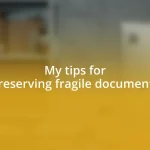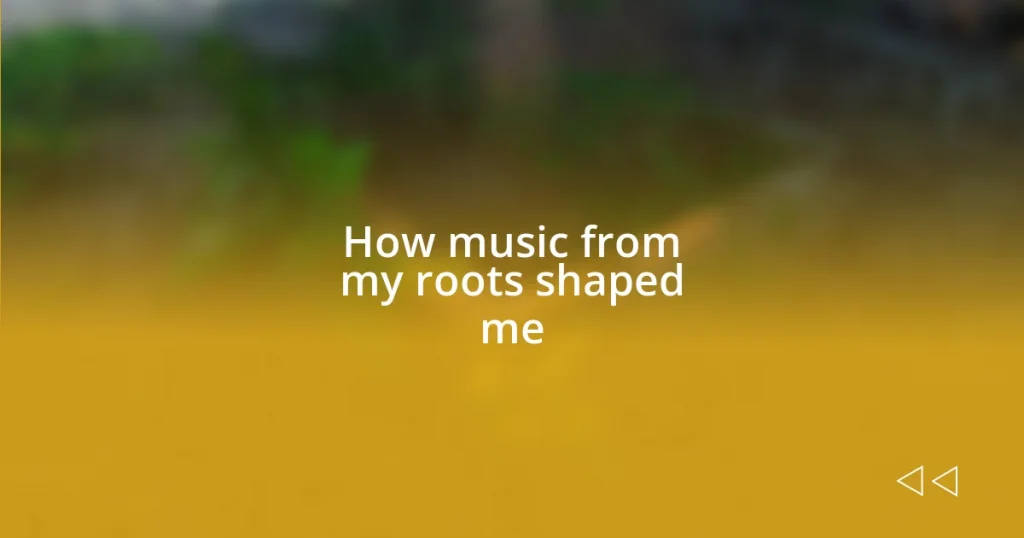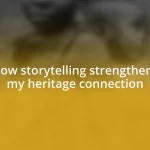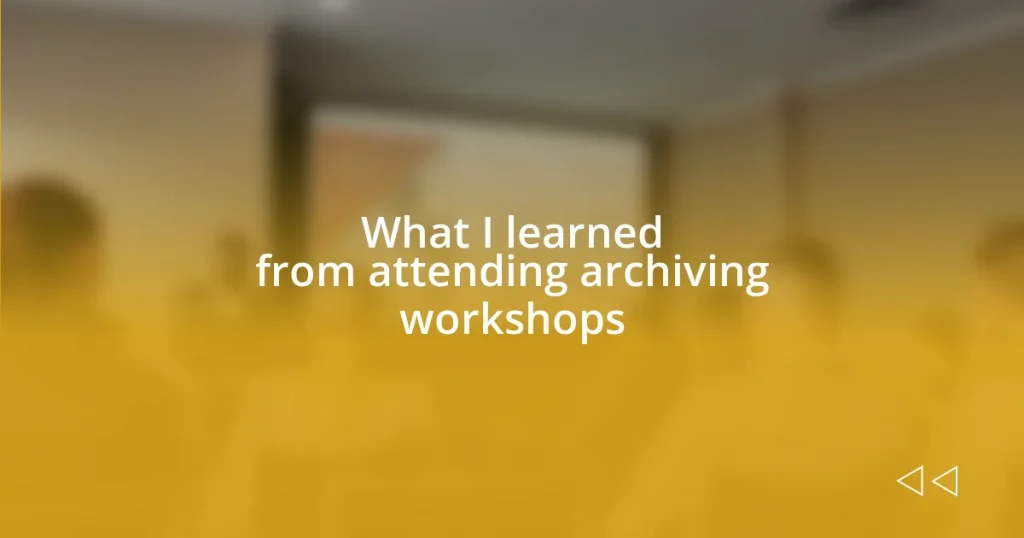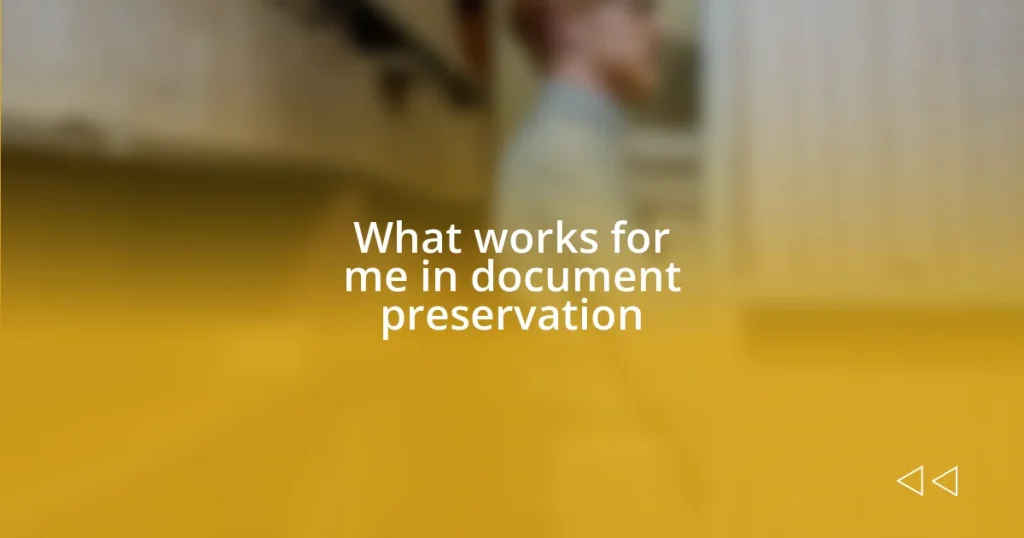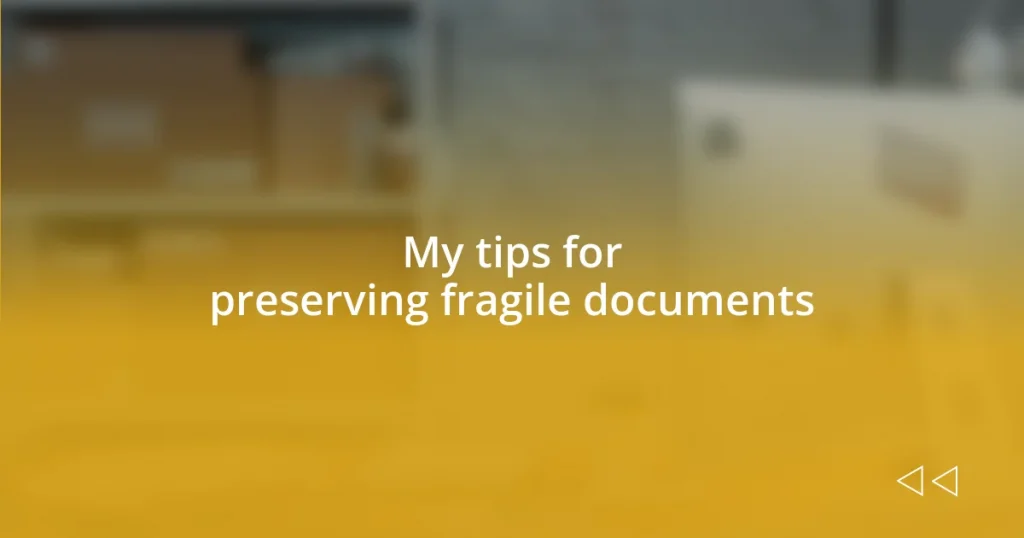Key takeaways:
- Music serves as a powerful connection to cultural roots, evoking memories and emotions that reflect personal and communal heritage.
- Engagement with traditional music fosters personal growth, self-expression, and resilience, influencing both social interactions and emotional well-being.
- Practical exercises, like journaling and creating personal playlists, deepen understanding of one’s musical roots and enhance appreciation for cultural traditions.
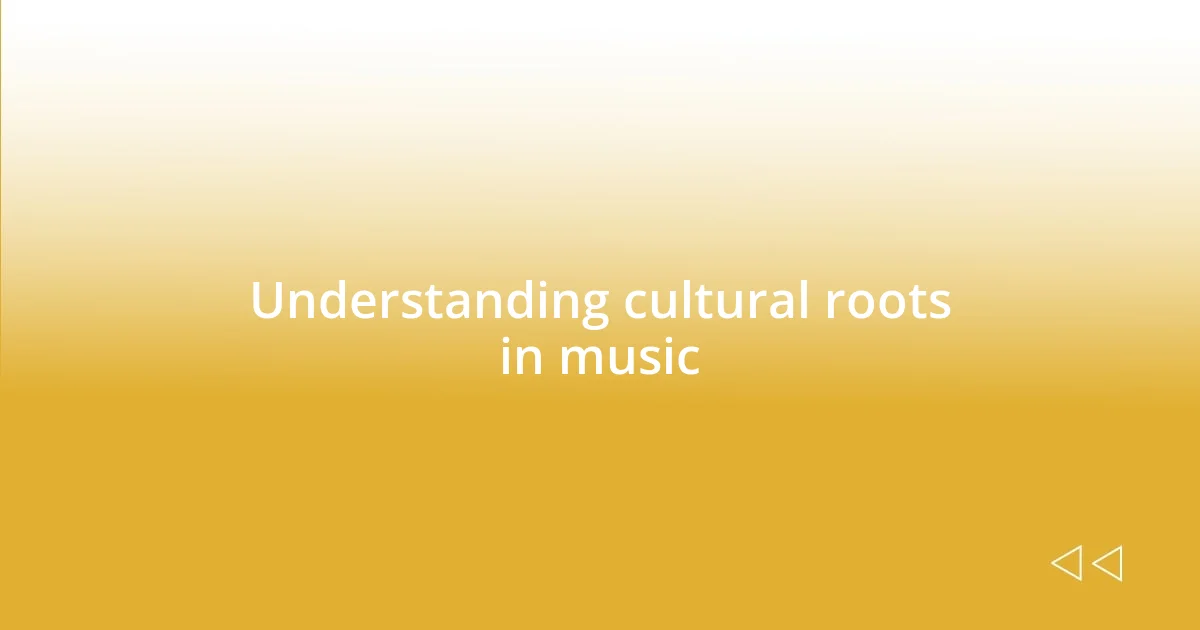
Understanding cultural roots in music
Understanding cultural roots in music is like unraveling a beautifully woven tapestry of history, emotions, and identities. Each note, each rhythm tells a story that echoes the traditions of our ancestors. I often find myself humming tunes that remind me of my childhood, the way my grandmother would sway to the melodies in her kitchen, filling the air with warmth and nostalgia. Isn’t it fascinating how music can transport us to another time and place?
Music often serves as a mirror reflecting the values and struggles of a community. When I think about the songs that shaped my upbringing, I can see how they were more than just entertainment; they were the voice of my heritage. For instance, I vividly remember joining family gatherings, where we’d sing folk songs that spoke of our roots. Those moments didn’t just entertain us; they instilled a sense of belonging and pride in our shared history.
Moreover, I believe music has the power to connect us with our cultural roots in ways words sometimes can’t convey. Have you ever felt a chill when a familiar song plays, transporting you back to a joyous or poignant moment in your life? For me, hearing traditional music from my culture still evokes a rush of emotions, reminding me that these sounds carry the heartbeat of my ancestors. It’s this intertwining of personal and communal memory that makes understanding our musical roots so profoundly enriching.

Music’s influence on personal growth
Music has played a vital role in my own personal growth, acting as both a guide and a companion throughout various stages of my life. I remember walking into my high school gym, where the latest pop hits blasted from the speakers, instantly lifting my spirits and energizing me. Those shared moments of dancing with friends not only created cherished memories but also shaped my confidence and social connections. It’s incredible to think that the simple joy of a catchy tune can spark such profound growth.
- Music helps in self-expression, allowing me to articulate feelings I sometimes find hard to express.
- Participating in local music events has pushed me to embrace new experiences, expanding my comfort zone.
- My playlist often reflects my mood and can influence my outlook on life, proving how deeply intertwined music is with my emotions.
As I delve deeper into my musical journey, I’ve realized how it nurtures resilience within me. Listening to powerful anthems during challenging times has motivated me to keep moving forward. I recall a period when I was grappling with uncertainty about my future; those uplifting lyrics became my mantra, inspiring me to take risks and pursue my passion. The melodies seemed to whisper, “You’ve got this,” reminding me that every setback is merely a stepping stone toward growth.

Exploring traditional music genres
Traditional music genres are a gateway into the heart of our heritage. They not only reflect the sounds of specific cultures but also weave rich stories that have tangled through time. I recall the first time I attended a traditional dance festival, where the pulsating rhythms of drums compelled everyone to join in the circle. That sense of community, where strangers became friends over shared melodies, left a lasting impression on me. It was a powerful reminder of how music can unify us, breaking down barriers with every beat.
When I think of traditional music, I can’t help but draw comparisons to other genres that have emerged over time. For example, folk music often incorporates elements that invite participation, much like the joyful call-and-response style found in gospel music. Hearing these familiar tunes play during family gatherings evokes cherished memories; they remind me of my uncle strumming his guitar while we dancers twirled around, enveloped in the warmth of connection and shared tradition. This experience emphasized how music evolves, yet its core meaning remains deeply rooted in our identities.
Exploring traditional music genres has also opened my eyes to how they carry messages of resistance and resilience. For instance, during a recent visit to a cultural museum, I stumbled upon a poignant display about civil rights songs and their role in inspiring social change. Listening to those haunting melodies, I felt a surge of hope and empowerment resonating within me. It reaffirmed my belief that traditional music genres are not just relics but living expressions that continue to shape our dialogues today.
| Traditional Genre | Characteristics |
|---|---|
| Folk | Storytelling through lyrics, community participation, acoustic instruments |
| Blues | Expression of sorrow and resilience, distinct chord progressions, emotional vocals |
| Gospel | Spiritual themes, call-and-response, uplifting harmonies |
| Reggae | Roots in social and political messages, laid-back rhythms, incorporation of bass |

Connecting with family through music
Connecting with family through music has always been a special experience for me. I still remember summer evenings spent on my grandma’s porch, where her gentle voice would fill the air with old folk songs. It was our little ritual, as each note seemed to bind us closer, sharing stories rooted in our past. Have you ever felt that connection through a shared song? I know I have, and those moments made me realize that music can effortlessly bridge generational gaps.
Family gatherings often became a spontaneous concert, with my cousins grabbing instruments from every corner of the house. I recall one Christmas when my brother picked up a ukulele, and the rest of us followed suit, laughing as we attempted to harmonize to a familiar tune. That joyful chaos not only deepened our bonds but also cemented the idea that music was essential to our identity. It was a time when our worries faded, and the melodies transformed our home into a sanctuary of love and laughter.
I think of the way music preserves our family narratives, allowing us to recount our heritage. At family reunions, my mom would share stories behind each song—a kind of oral history intertwined with melody. For example, she often sang a lullaby her mother used to sing, and in those moments, it felt like we could almost hear our ancestors softly humming along. It’s a profound realization that music not only links us to our loved ones but also to the fragments of who we are. How beautiful is it that a few notes can encapsulate entire histories?
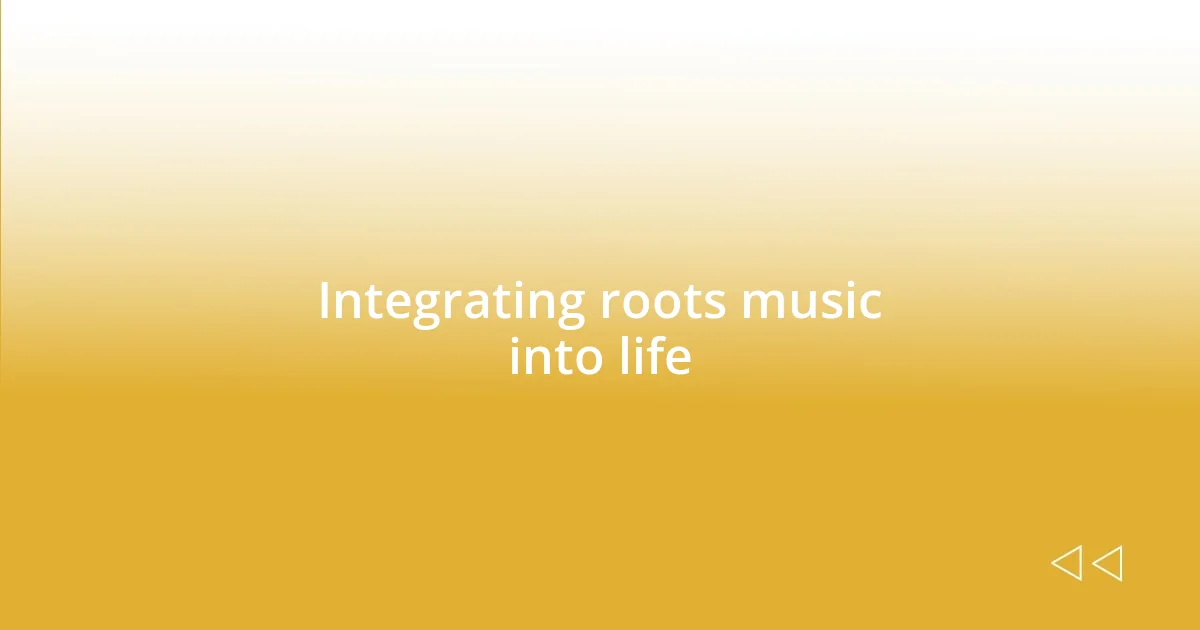
Integrating roots music into life
Integrating roots music into my daily life has transformed my everyday routines into a vibrant celebration of culture. For instance, when I cook, I often play traditional songs that remind me of my childhood. It’s incredible how the melodies can transport me back to my family kitchen, where my parents would cook while singing along. Can you picture that ambiance? Those sounds not only spice up the cooking process but also weave a tapestry of flavors and memories I cherish.
Incorporating roots music into my life extends beyond the home; it also plays a pivotal role in my social experiences. I remember attending community gatherings where traditional musicians would perform, and I felt an undeniable urge to dance. The infectious rhythms seemed to pull everyone into a collective movement, as strangers turned into friends through the simple joy of shared music. It’s fascinating how those moments can shift our perspectives and create a sense of belonging that resonates deeply within me.
I’ve also found that roots music enhances my mental well-being. On days when I’m feeling overwhelmed, I turn to playlists filled with songs from my heritage. There’s something soothing about those familiar sounds, like a gentle reminder of resilience and strength from my ancestors. Have you ever noticed how a song can feel like a warm embrace? For me, that connection underscores the importance of keeping these musical traditions alive, as they nurture my spirit and inspire me every day.
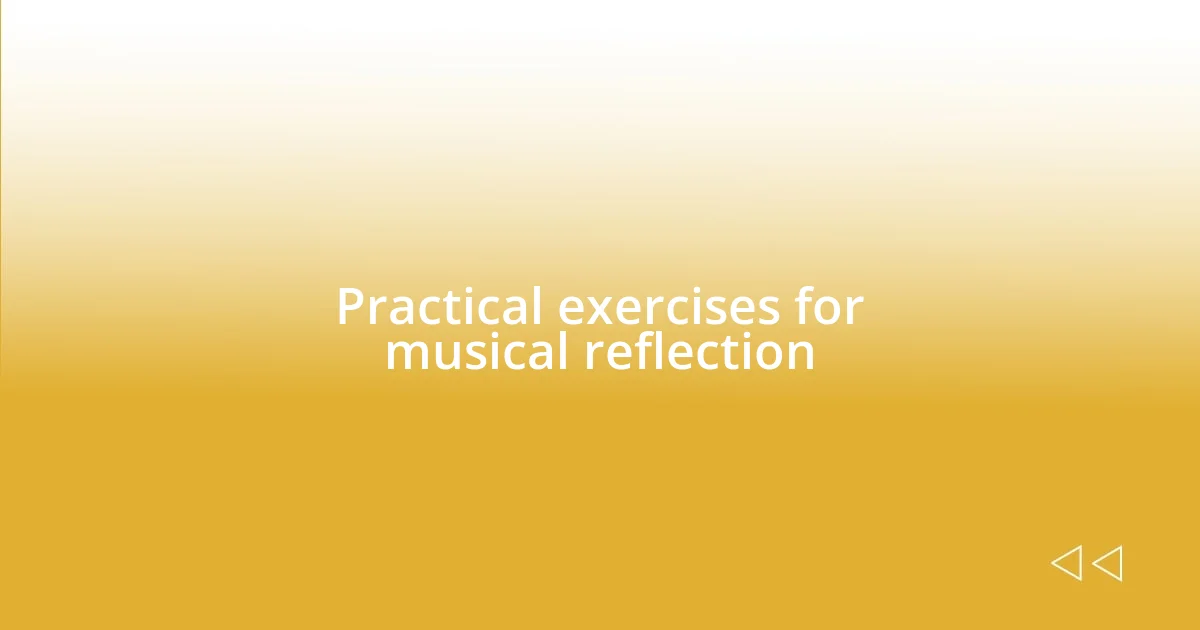
Practical exercises for musical reflection
Reflecting on my musical roots has become a profound exercise that anchors me in my identity. One practice I cherish is journaling after listening to a specific song that resonates with me. I jot down my feelings, memories, and any stories that the music evokes. This act not only sharpens my appreciation for the melodies but also reveals layers of my heritage that I hadn’t consciously explored before. Have you ever experienced a song that stirs emotions you didn’t know you had?
Another practical exercise I find valuable is creating a personal playlist that represents pivotal moments in my life, emphasizing songs tied to my cultural background. Once, I compiled tracks for a friend’s wedding, choosing songs that narrated my family’s love stories through the decades. As I arranged them, I realized how each song served as a chapter in our shared history, celebrating love and connection. It was a powerful affirmation of how deeply music can carve out the essence of our experiences.
Lastly, I encourage trying out a simple musical meditation. Sit with a song that holds meaning for you, close your eyes, and immerse yourself in its sound. As the music plays, visualize the memories it brings forth. I vividly remember one session where an old lullaby transported me back to my childhood bedroom, enveloped in my mother’s warmth. How often do we take a moment to simply feel? This practice not only deepens my understanding of my roots but also allows me to cultivate gratitude for the melodies that shape who I am every day.


